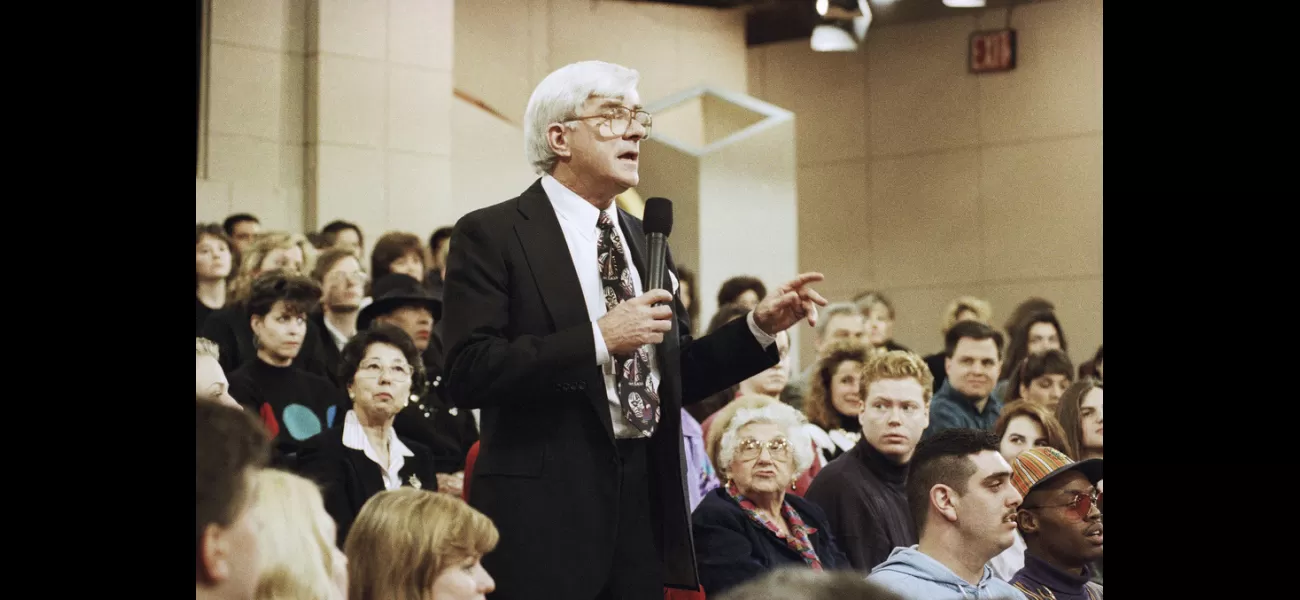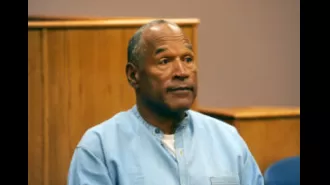Phil Donahue, a groundbreaking host of a popular daytime talk show, passed away.
The show created a popular TV genre and launched the careers of Oprah Winfrey, Montel Williams, Ellen DeGeneres, and others.
August 19th 2024.

The world of television has lost a true pioneer. Phil Donahue, a man who revolutionized the daytime talk show genre, has passed away at the age of 88. His groundbreaking show paved the way for others, including Oprah Winfrey, Montel Williams, and Ellen DeGeneres, to achieve success in the industry.
According to family members, Donahue passed away on Sunday after a long battle with illness. His show, "The Phil Donahue Show," first aired in Dayton, Ohio in 1967 and quickly gained popularity for its unique format that incorporated audience participation and focused on one guest per episode.
In his 1979 memoir, "Donahue, My Own Story," Donahue recalls being questioned about his unconventional approach to talk shows. "Just one guest per show? No band?" people would ask. But this format set his show apart from others and made it a trendsetter in daytime television, especially among female audiences.
Throughout its 26-year run, the show tackled a variety of controversial topics, including feminism, homosexuality, consumer protection, and civil rights. Donahue was not afraid to explore hot-button issues and his willingness to do so earned him 20 Emmy Awards and a Peabody Award.
In May of this year, Donahue was honored by President Joe Biden with the Presidential Medal of Freedom, recognizing him as a pioneer in the world of daytime talk shows. His show featured radio-style call-ins, with Donahue's signature greeting of "Is the caller there?"
In 1996, the show came to an end in New York, where Donahue was living with his wife, actor Marlo Thomas. The two had first met when she appeared as a guest on his show in 1977. Donahue later said it was love at first sight and their chemistry was evident to viewers.
Donahue had five children from a previous marriage and had been married to Marlo Thomas since 1980. After a brief return to television in 2002, hosting another version of "Donahue" on MSNBC, the show was cancelled after just six months due to low ratings.
Born in Cleveland in 1935, Donahue was part of a middle-class Irish Catholic family. He attended St. Edward High School and graduated from the University of Notre Dame with a degree in business administration. Although he later rebelled against and left the church, he always maintained a small piece of his faith.
After a series of jobs in radio and TV, Donahue was invited to bring his radio talk show to Dayton's WLWD television station in 1967. It later moved to Chicago, where it stayed for years before ending its run in New York. The show featured a wide range of guests, from spiritual leaders and doctors to homemakers and entertainers.
Donahue's formula for success was a happy accident, as he described in his memoir. The lack of familiar talk show hosts in Dayton forced the show to improvise, leading to a sense of freedom and spontaneity that continued even as the show gained popularity.
Donahue's friendly demeanor and signature salt-and-pepper hair made him a beloved figure on the show. He even got into the ring with Muhammad Ali and played football with Alice Cooper. But it was his willingness to cover controversial topics that truly made his show stand out.
In addition to his famous talk show, Donahue also worked on other projects, including a groundbreaking discussion series with Soviet journalist Vladimir Posner during the Cold War. He also co-hosted a weekly roundtable show on CNBC in the 1990s and co-directed the Oscar-nominated documentary "Body of War" in 2006.
The world will always remember Phil Donahue as a true pioneer in the world of television, whose legacy will continue to inspire and influence generations to come.
According to family members, Donahue passed away on Sunday after a long battle with illness. His show, "The Phil Donahue Show," first aired in Dayton, Ohio in 1967 and quickly gained popularity for its unique format that incorporated audience participation and focused on one guest per episode.
In his 1979 memoir, "Donahue, My Own Story," Donahue recalls being questioned about his unconventional approach to talk shows. "Just one guest per show? No band?" people would ask. But this format set his show apart from others and made it a trendsetter in daytime television, especially among female audiences.
Throughout its 26-year run, the show tackled a variety of controversial topics, including feminism, homosexuality, consumer protection, and civil rights. Donahue was not afraid to explore hot-button issues and his willingness to do so earned him 20 Emmy Awards and a Peabody Award.
In May of this year, Donahue was honored by President Joe Biden with the Presidential Medal of Freedom, recognizing him as a pioneer in the world of daytime talk shows. His show featured radio-style call-ins, with Donahue's signature greeting of "Is the caller there?"
In 1996, the show came to an end in New York, where Donahue was living with his wife, actor Marlo Thomas. The two had first met when she appeared as a guest on his show in 1977. Donahue later said it was love at first sight and their chemistry was evident to viewers.
Donahue had five children from a previous marriage and had been married to Marlo Thomas since 1980. After a brief return to television in 2002, hosting another version of "Donahue" on MSNBC, the show was cancelled after just six months due to low ratings.
Born in Cleveland in 1935, Donahue was part of a middle-class Irish Catholic family. He attended St. Edward High School and graduated from the University of Notre Dame with a degree in business administration. Although he later rebelled against and left the church, he always maintained a small piece of his faith.
After a series of jobs in radio and TV, Donahue was invited to bring his radio talk show to Dayton's WLWD television station in 1967. It later moved to Chicago, where it stayed for years before ending its run in New York. The show featured a wide range of guests, from spiritual leaders and doctors to homemakers and entertainers.
Donahue's formula for success was a happy accident, as he described in his memoir. The lack of familiar talk show hosts in Dayton forced the show to improvise, leading to a sense of freedom and spontaneity that continued even as the show gained popularity.
Donahue's friendly demeanor and signature salt-and-pepper hair made him a beloved figure on the show. He even got into the ring with Muhammad Ali and played football with Alice Cooper. But it was his willingness to cover controversial topics that truly made his show stand out.
In addition to his famous talk show, Donahue also worked on other projects, including a groundbreaking discussion series with Soviet journalist Vladimir Posner during the Cold War. He also co-hosted a weekly roundtable show on CNBC in the 1990s and co-directed the Oscar-nominated documentary "Body of War" in 2006.
The world will always remember Phil Donahue as a true pioneer in the world of television, whose legacy will continue to inspire and influence generations to come.
[This article has been trending online recently and has been generated with AI. Your feed is customized.]
[Generative AI is experimental.]
0
0
Submit Comment





